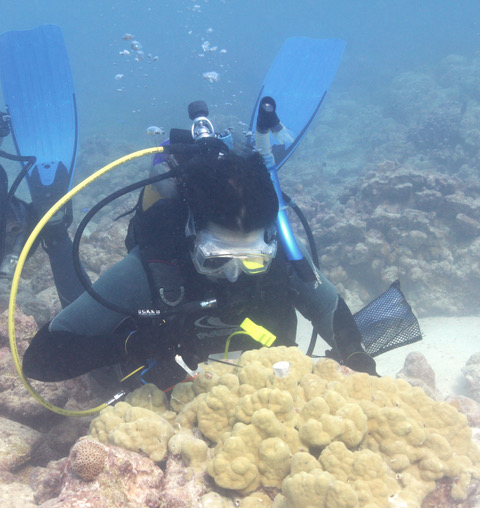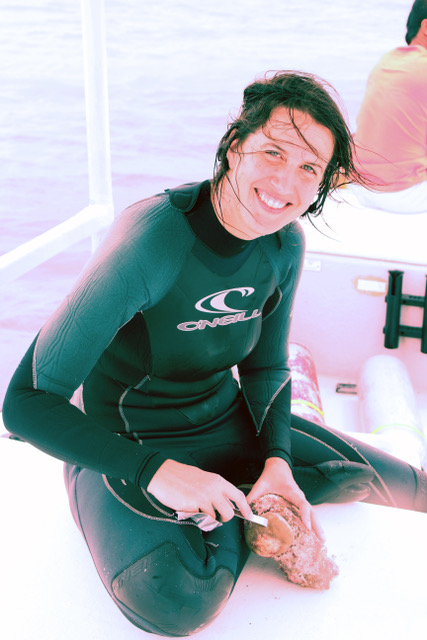Faculty Spotlight: Alyssa Atwood

Alyssa Atwood is an assistant professor in the Department of Earth, Ocean and Atmospheric Science, part of the College of Arts and Sciences. Atwood has taught courses in oceanography and meteorology since joining FSU in 2019. She earned dual bachelor’s degrees in physics and atmospheric science from the University of California, Berkeley, and both a master’s degree and doctorate in oceanography from the University of Washington.
Tell us a little about your background.
I grew up in a small northern California town where I was a student of the earth sciences long before I knew it was a field I could pursue. As a child, I spent a lot of time outdoors playing in redwood forests, in the mountains, and on the beach.
When did you first become interested in topics like paleoclimatology — the study of past Earth climates — and tropical climate change?
I became interested in studying climate science while at UC Berkeley, where I was introduced to the field through courses in physics and atmospheric science. During my last year as an undergraduate, I secured a position as a research assistant in a biogeochemistry lab where I was involved in different lab and field projects. This experience pushed me to pursue a career in climate science research that combined the theoretical side of my physics education with the experimental nature of my lab and field-based work. I wanted to pursue graduate research that would allow me to bridge the fields of geochemistry and climate dynamics, which is what brought me to the field of paleoclimatology.

I found my next academic home at the University of Washington, where I bounced between the School of Oceanography and the Atmospheric Sciences Department, studying tropical climate variations of the past and future. For the first half of my graduate program, I worked in an organic geochemistry lab developing new techniques to reconstruct past tropic rainfall variations using the hydrogen isotopic composition of algal lipids preserved in lake sediments. The last half of my program involved studying the principles of tropical climate dynamics and learning techniques to merge paleoclimate observations with instrumental data and models to inform projections of future climate change.
What are your current research interests?
My research focuses on combining new high-resolution records of past tropical climate variability from corals and lake sediment with modern data, theory and climate models. I am passionate about the interdisciplinary nature of my research, and I believe having a range of skills is helpful in studying the complexities of the climate system.
What do you want the public to know about your research? Why is your topic important?
One of my primary research interests revolves around tropical Pacific climate variability. The tropical Pacific Ocean is the heat engine of the global climate system and is unique in its ability to rapidly reorganize and project climate changes across the globe, as demonstrated by the El Niño/Southern Oscillation phenomenon. Extreme ENSO events can affect people’s lives and their natural environments through drought, flooding, crop failure, disease and major disruptions to marine ecosystems.
Despite decades of research, we have very limited understanding of how these events are likely to change in the future. My research activities focus on carefully combining climate models and data in order to characterize natural climate variability, identify mechanisms of climate change and, ultimately, make improved forecasts of future climate change.
What brought you to Florida State? Why do you enjoy working here?
I was thrilled to come to FSU because of its commitment to excellence in interdisciplinary research and student education. From the research facilities in the new Earth, Ocean, and Atmospheric Science building, to the geochemistry group at the National High Magnetic Field Laboratory, I am lucky to have these world-class resources at my fingertips. My passionate colleagues and graduate students in the EOAS department are an absolute joy to work with every day.
What is your favorite part of your job and what do you find most challenging?
I am still learning and enjoying new aspects of being an assistant professor every day. Finding the perfect harmony in building a new lab and research team, being a good mentor to my students, and maintaining a healthy work-life balance during a global pandemic have all been a part of a constant but largely rewarding challenge. Working with my students and watching them grasp difficult concepts and develop into independent researchers has been one of the most satisfying aspects.

How has COVID-19 impacted your research and your role as a professor?
Due to the pandemic, a number of my research collaborations have been put on hold as labs across the country temporarily closed down. Travel restrictions have delayed field outings to some of my research sites, including one on the remote coral atoll of Kiritimati that requires regular maintenance of instruments and sample collections. As a new professor, developing new courses on climate science and paleoclimatology while formatting them for online instruction has had a steep learning curve. Another major challenge has been finding creative ways to help my students feel engaged and not overly isolated amid the pandemic. I am grateful for their resilience during these challenging times.
Who are some of your role models?
I consider myself extremely lucky to have had many excellent role models in my career. One of my greatest role models is my former doctoral adviser and atmospheric sciences professor, David Battisti, as well as professors Julian Sachs, Cecilia Bitz, and Dargan Frierson from the University of Washington. My former postdoctoral advisers, Kim Cobb and John Chiang have also been wonderful role models and mentors, and I will forever be grateful to my former Berkeley undergraduate adviser, Robert Rhew. These folks have made enormous contributions to the field of climate science and are driven by their insatiable curiosity and desire to understand the environment around them. They are positive agents for change in a field that’s working towards a more equitable and inclusive future.
What do you like to do in your free time?
My favorite activities around Tallahassee have been exploring the freshwater springs and bike trails. I also love to read, scuba dive, rock climb, cook and grow vegetables in my garden.
If you had to give one piece of advice to your students (of course, hopefully they learn much more than that), what would it be?
Don’t be afraid to ask for help when you need it. As a professor and research supervisor, a big part of my job is to facilitate and inspire my students’ education. Because learning is a very individualized experience, communicating your needs early and often is essential to paving the way to success.

